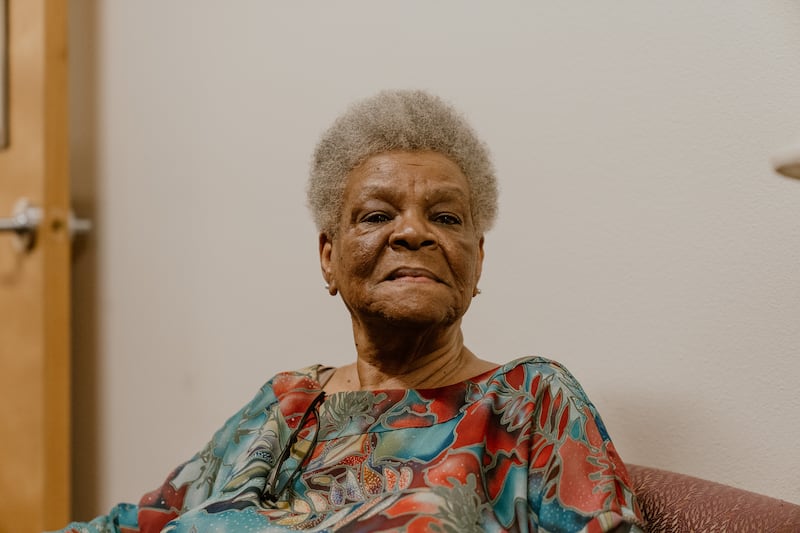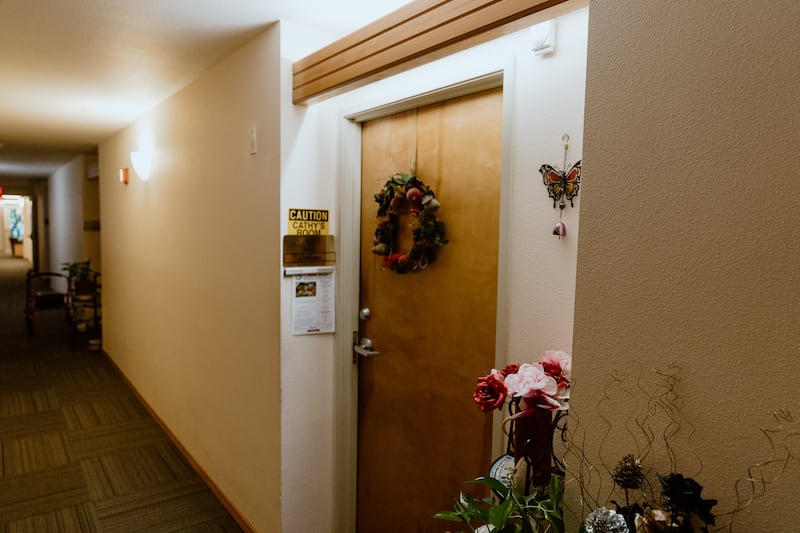Cathy Mayes has lived at the Allen Fremont Plaza Apartments in Northeast Portland for 21 years. She’s retired but keeps herself busy by taking walks around the neighborhood, praying for Portland and its citizens every Tuesday and Thursday morning, and checking up on the welfare of the building’s older tenants. She also cooks for residents and decorates communal spaces for special occasions.
In February, Reach Community Development Corporation, the nonprofit developer that owns and manages the building, stopped accepting Mayes’ rent checks. Later that month, it served her with an eviction notice, saying she owed too much back rent to stay.
“My heart feels like sometimes it’s going to jump out of my chest because I want this over with,” Mayes says.
Mayes is one of more than a dozen low-income tenants at the senior building whose future tenancy has been thrust into question over the past nine months in a confusing tangle of alleged outstanding rent balances, bounced checks and eviction notices.
Since January, residents say, Reach has posted eviction notices on at least 15 doors of the 60 tenants living at the Allen Fremont Plaza. Most of them are elderly, low-income Black Portlanders who have lived there for years. In rent ledgers, Reach alleges some tenants owe as much as $13,000 in missed rent and other charges.
Allen Fremont Plaza tenants say Reach’s actions show a pattern of mismanagement and poor accounting. They allege a slew of missteps: double billing tenants, losing checks, serving erroneous eviction notices, making accounting errors, and waiting years before notifying tenants of outstanding balances. The expiration of pandemic-era rent forgiveness now allows landlords to collect back rent first. That’s what Reach says it’s doing.
Most of the tenants adamantly maintain they always pay their rent. They express fear of losing their housing. And they say they’ve received no clarity from Reach, one of the largest housing nonprofits in the Portland area.
“It’s akin to elder abuse,” says Sarah Hornor, a 70-year-old tenant.
Reach said in an email to WW that it relies on income from rent to keep its properties open, which is part of why it made the change to start collecting back rent and enforcing leases last fall. As for accounting errors, Reach said: “Occasionally, there is an issue when we are pulling in subsidy from other sources, and we work to correct it.” (Most Allen Fremont tenants receive subsidies to help pay for monthly rent.)
Reach also told WW that it posted no eviction notices in May, and that ones tenants received were old notices reissued because of changes to landlord-tenant law. WW obtained hard copies of at least four dated May 9.
On a recent Wednesday morning, 15 Allen Fremont tenants gathered in foldout chairs in the building’s communal kitchen, each holding a stack of papers. Streamers and balloons left over from recent celebrations—a baby shower for one of the tenant’s daughters, then a birthday—hung from the walls, and tenants sat at big round tables as they recounted their confusion and fear over the past nine months.
“It’s more stressful than I realize,” says Edna Fisher, a tenant. “People are sick about it.”

WW reviewed tenants’ carefully kept ledgers, eviction notices, emails, receipts, and other documents from the past five months.
The documents show some contradictory numbers and confusing eviction notices.
The trouble first started in June 2023. Reach sent a letter to tenants explaining a change in state landlord-tenant laws that meant payments would now be applied to the oldest charges on a tenant’s ledger. Thanks to the change, any rent checks would go toward fulfilling outstanding balances and the rent for the current month would be left unpaid. Reach stopped accepting checks from tenants with outstanding balances in September 2023, calling them partial payments.
Reach would only begin accepting them again once tenants paid in full what the CDC said they owed.
In other words, the landlord applied any new rent checks to back rent and marked the most recent month as unpaid.
Becky Straus, managing attorney of the Oregon Law Center’s Eviction Defense Project, tells WW that the legislative change Reach cites is a return to how rent payments were applied before the COVID-19 pandemic.
“Those laws have expired and we’re back in the pre-pandemic law, which set out the order of payments to require back rent first,” Straus says. “The need for emergency rent assistance…is overwhelming and should be a key focus in all of our homelessness prevention work.”
None of the tenants who spoke to WW believed they had large outstanding balances, but a few said they may have missed a rent payment here and there.
Mayes started having issues a little later. Reach stopped accepting her checks in February 2024 until she paid the full amount the CDC said she owed, which, at the time, was around $1,700, according to her ledger. Reach kept charging her for rent and late fees even though she says the reason they were late was that Reach wouldn’t take her checks.
On May 9, Reach taped an eviction notice on Mayes’ door. The first page of the document stated she had an unpaid balance of $3,053. The second page said she owed $9,004.
She isn’t the only tenant to find a discrepancy like that on an eviction notice. Victoria Blufoes also received one that tells her she owes two different amounts: $338 on the first page and $9,004 on the second.
Mayes insists she always pays her rent, and that the only time she missed was when the rate had gone up and she didn’t know how much she had to pay. She said she asked the building manager, who didn’t know the answer either.
The Urban League connected Mayes to a public defender. She isn’t sure what the status of her eviction is.
“It’s just like something hanging on you, pinching you,” Mayes, 77, says, “and you want to let go.”
Fisher, 80, another Allen Fremont tenant, has lived at the apartments for five years and been served with four eviction notices in that time. “I have a tendency to just kind of look at them and not pay any attention because I know I pay my rent,” Fisher says.
In January, Fisher says Reach told her she owed $10,000. As it did with other tenants, the CDC stopped taking her checks until she paid her balance. “I just don’t have $10,000 lying around,” she says.
Like other tenants, Fisher says her outstanding balance—now almost $13,500—is inexplicable because she always pays her rent on time. She says she did receive some rent assistance, but wasn’t told when it expired, so she didn’t know when to start paying again.
Like Mayes, Fisher has a public defender. They could not be reached for comment.
More than a dozen residents described similar inconsistencies and general anger and confusion over Reach’s management of their housing.
Some tenants say they are receiving legal support and advice from the Urban League of Portland, which provides rental assistance for a portion of Allen Fremont tenants. The Urban League’s media relations team declined to comment whether the nonprofit was providing aid to specific Allen Fremont tenants, but clarified that it regularly assists tenants around Portland to understand their ledgers, helps them find legal support, and answers rent-related questions.

Reach CDC is one of the largest developers of low-income housing in Portland. The nonprofit houses more than 3,500 people in Portland and Vancouver, Wash. Reach’s total revenue in 2022 was $23.5 million. The organization’s CEO made $178,000 that year.
In 2022, WW reported the abrupt closure of a downtown Portland building that Reach also owned. The sudden shuttering of the Taft Home for low-income seniors displaced 60 tenants (“The Mystery of the Taft Home,” July 27, 2022).
That same summer, five Allen Fremont tenants sued Reach over what they called “unsafe, unsanitary conditions” at their building. The tenants alleged broken toilets and elevators, a lack of adequate security and lighting that abetted drug use and drug dealing in the building, poor ventilation, and a lack of safety measures against fire hazards. The parties settled in early 2023, and Reach, among other provisions, pledged to fix some of the problems.
A little less than two months after that suit, a tenant at a different Reach building filed a similar lawsuit, alleging overflowing trash cans, inadequate weatherproofing, and criminal activity and squatting by non-residents.
Hornor says she’s seen the well-being of Allen Fremont tenants decline since eviction notices started appearing on their doors.
Mayes agrees. “It’s just too much pressure and stress. I mean, it’s about where you’re going to live,” she says. “That’s the most important thing.”
